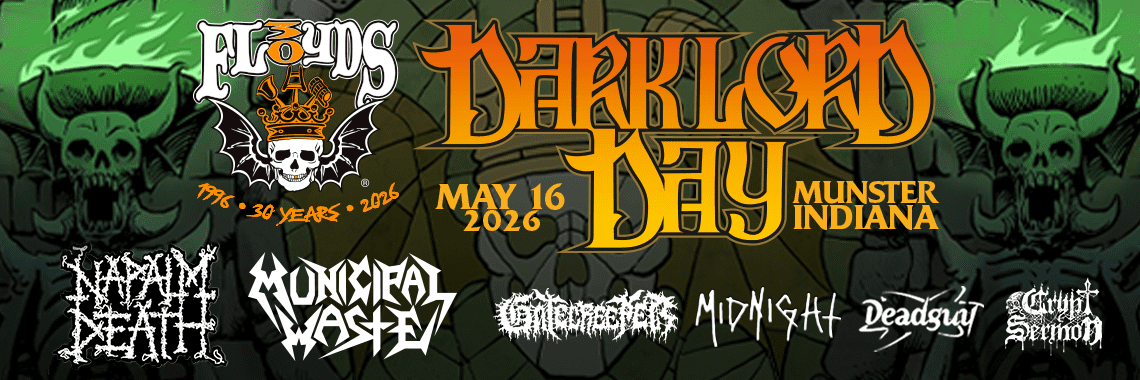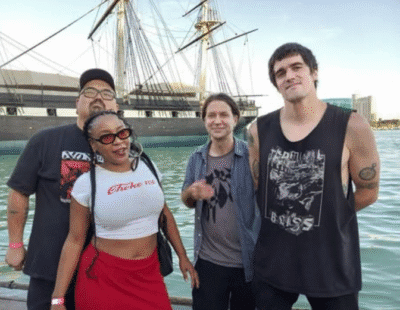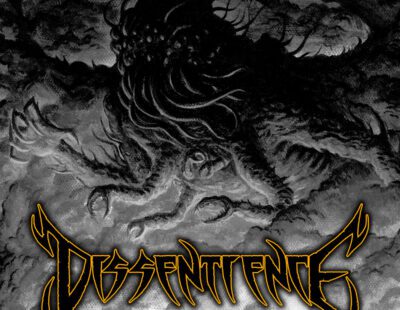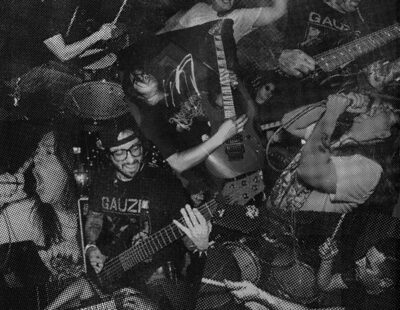
Hailing from Abu Dhabi, the capital of the United Arab Emirates, progressive power thrashers Anuryzm are set to release their second full-length on June 15th, All is Not For All. The album, in addition to sporting a killer-looking, glowing radioactive rhino on the cover, features guest spots from the likes of Michael Lepond (Symphony X), Uri Dijk (Textures, Ethereal), Charlie Zeleny (Whiplash), and interestingly, Christopher Chaplin (the youngest son of the late Charlie Chaplin) playing cello on a track and is a textural and nuanced tour-de-force. It’s a very classy helping of streamlined metal which has me thinking that if there was such a subgenre as “caviar and champagne metal,” Anuryzm would be the leaders of that particular pack. Also very interesting is the fact that they hail from Abu Dhabi, which isn’t exactly a locale known for being a homebase for a lot of metal. So, I got in touch with guitarist John Bakhos and vocalist Nadeem Michel Bibby in order to explore my on-going curiosity about metal from places not normally associated with metal and to discuss the band’s forthcoming album.
I understand that your band history is a long, winding and complex tale involving a number of countries and it stands that, even though you’re based in the United Arab Emirates, none of you actually are UAE natives and so on…I know this could be a long answer, but what’s the story behind the band’s history?
John Bakhos [guitar/main composer]: In an absolute nutshell, Nadeem [Michel Bibby, vocals] and I grew up together as typical third culture kids; children of ex-pats, in Abu Dhabi. We used to play covers in a band in high school together in the mid 90s, mostly thrash, etc. When the time came to go to university, I went off to Lebanon whilst Nadeem went to the U.S. We both continued working on musical interests abroad, with him focusing more and more on his vocals and me on my guitar playing and compositions. We lost touch for a long time whilst I had tried several incarnations of Anuryzm in Lebanon, Turkey and Canada before returning to the U.A.E. and reconnecting with Nadeem again. Since that day, we’ve been on a roller coaster ride that’s lead to a ton of great shows, collaborations with international talents, and two full-length records.
Growing up in the Middle East, how did you discover metal? Compared to the stories we’ve heard about how difficult it was to access metal back in the 80s and 90s, I’m assuming that access has become much easier?
Nadeem: It’s a popular misconception that counterculture music (rock, hip-hop, etc.) in general, was hard, or is hard, to find in the Middle East. If you think about it, we were in Abu Dhabi, U.A.E, a small and significantly less conservative country than much of its regional neighbors, so music was always available. It’s true that underground or extreme metal was very hard to find in the 80s and 90s, however typical stalwarts such as Metallica, GnR, Sabbath, Maiden etc. as well as more contemporary influences such as Michael Jackson, Prince, Pink Floyd, etc. always lined the shelves of your friendly neighborhood cassette merchant! My dad had some Black Sabbath and Iron Maiden record lying about and, for me, that’s all it really took to capture my interest.
With that in mind, has the mood towards metal and the validity of metal as a musical art form made strides with the general public? Or are people still freaked out about the black t-shirts, long hair and dark imagery? I noticed you’ve been nominated for a People’s Choice Award, so things can’t be that bad!
John: I don’t think metal as a genre is seen as a negative factor in society, it was just as alien as hip-hop or electronic music or whatever genre in its infancy, so no one was freaked out by heavy metal culture per se. But yes, when we were younger, the long hair and dark imagery did attract more looks, but was never a major issue. With that being said, performing arts and arts in general are still seen as extracurricular activities and not as very important in the Middle East.
What are the specific challenges that a band like yours faces that you feel other bands – Middle Eastern or otherwise – don’t have to deal with?
Nadeem: For me, the absolute biggest challenge is objectivity. The majority of people will look at a band and think that because we (or others) are based in the Middle East, our work ethics may be less than stellar, or we must not be any good. This attitude of general non-support may reflect on how a global audience may view us. We have been INCREDIBLY lucky in the sense that the vast majority of our fans or listeners etc. are based around the world and so we are not very reliant on the regional press or media to support us, but that would be a major and specific challenge. Pre-conceived notions of what an artist from this side of the world should sound like and general non-support. The rest of the challenges are pretty much exactly the same as any other band anywhere in the world: lack of resources, rehearsal spaces, etc. Very typical stuff that we have managed to work around.
With roots in Lebanon, Canada and the U.A.E., how would you compare and characterize the different scenes you’ve had experience with against one another?
Nadeem: You can add another dimension, the U.K. I was born and raised in London and my family are still based in the U.K., so I would spend summers growing up going to festivals like Donnington Monsters of Rock before the transition to Download and so on. The U.K. scene, and metal in general, was obviously huge, but there was literally no scene in the U.A.E. until very recently.
John: As expected, the European and North American scenes are larger and healthier. However, a major difference is the support factor and emphasis on live music that you get from infancy and incubation stages abroad. Hopefully as more venues open up in Abu Dhabi and Dubai, younger bands can fine tune their skill-set and expose themselves to more people.
Anuryzm is obviously more on the progressive/power metal side of things. Is this a popular sub-genre in your part of the world? Or do you find people coming together more under the banner of metal as a whole as opposed to this and that elitist sub-genre of metal?
Nadeem: I feel like all the interview questions are set up for us to sound negative – ha ha!!! No, unfortunately progressive rock and metal is not a popular sub -genre in this part of the world as more extreme subgenres are the norm. However, there are always people (mainly older) who grew up in the 80s and early 90s who look at metal and music in general as being under a banner of “metal” or “good music.” Variety is the spice of life!
What would you say are the more popular sub-genres and bands in U.A.E.?
Nadeem: The U.A.E. is a very varied market. You have everything from traditional folk music to death metal so I really don’t know how to answer this question.

Ok, enough socio-ethno-musicology! Let’s talk about your new album. How long was it in the works and how was the creative process (both writing and recording) of All is Not For All different from Worm’s Eye View?
John: Oh man! We started writing All is Not For All right after we started doing shows in support of Worm’s Eye View. However, we only took the time to really focus and finalize the music in 2014. Day jobs, touring and writing do not go hand in hand as I’m sure you’d agree! The creative process wasn’t a whole lot different for me than Worm’s Eye View. Just a whole lot deeper, I think. Recording took a very long time mostly because of hectic work schedules between us and all the session players. It’s always a big challenge working with musicians that live far away, but it was a necessary process to ensure a great final product. Working on WEV was somewhat easier to record than this album, but overall the process was more or less the same.
Nadeem: John really is the magician behind the music and I think the only real difference for AINFA was that we focused more on themes and vibes that we always wanted to incorporate in our sound but didn’t previously. Recording was a lot easier as we wrapped this up in Abu Dhabi rather than in Dubai, so no more long days at work, followed by long drives, followed by long studio sessions, thank goodness!
What do you feel you learned in doing the first album and the four or so years since the first album that you applied to the new album?
Nadeem: I learned that you have to be true to your music and themes no matter what; you have to work hard to be on the global stages and you NEVER, EVER eat the free cold cuts backstage!! Seriously though, it’s that there is no substitute for hard work and that we as a band can afford to take risks musically as a global audience tends to appreciate innovation.
John: The songs on the first album were very varied. You’d get a hint of the style of music we’d be playing then on the next song, you’d change your mind, and the one after. Although that can usually be a good thing, we felt that this time around we wanted to try and deliver a unified album with songs that were closely interlinked. In terms of actual recording, we learned to focus a lot more on dynamics, musical fluidity, and simple things we didn’t carefully watch out for on the first record like bass volume, solo volume, etc. This new album is far superior to the first in terms of production and by continuing to work with Miltiadis Kyvernitis (co-producer and mixing engineer) we made sure of that.
What’s the story behind the meaning of the title and how does the radioactive rhino on the cover apply to it?
Nadeem: All is Not For All, basically talks about responsibility; that not everyone can handle everything, riches, fame, success and power. Perhaps it stems from everyone wanting to get to the top and cheat their way through society, not putting in the hard work. In the long standing tradition of progressive rock and metal, I think a lot of our concepts are open to interpretation, but for me, once again, it’s that hard work and responsibility hardens oneself and is not for everyone. We do have a running theme with the “worm” (corruptor, human) and his negative influence on society. This new record is a prequel to Worm’s Eye View and so you see the “worm” considering messing with the rhino. Why a rhino? Well, it’s an awesome, endangered and chilled out animal that is only really aggressive when threatened. Both the “worm ” and the rhino represent a lot, but I’ll leave it to the listeners to form their own interpretations once the record is released.
Tell us about the guest spots on the album. And how the hell did you get Charlie Chaplin’s son involved?
John: Charley Zeleny (drums) and I have been in touch since 2008 or 2009. He’s quite an active performer and always involved with new projects. We touched base back when I was in Canada, but never had the opportunity to work together. And out of the blue he contacted me just before I was ready to start working on the new album and I invited him to come on board! When we started tracking drums, we didn’t have a full-time bassist in the band at the time, I was struggling to find a competent player that would do justice to the songs on the new album because this time I wanted to experiment a little more with our sound to get more of a progressive metal element integrated into the music. I was lucky enough to have introduced the music to Michael LePond who seemed quite happy to help out. Uri Dijk (synths) had done some amazing work for us on the first album, so we didn’t hesitate to ask for his assistance again at bringing all the synth and keyboard elements to life.
Nadeem: Christopher Chaplin is an amazing composer and has done some fantastic string arrangements. He also has a very eclectic taste in music so I thought he would fit very nicely on “Oceans Apart,” and he was kind enough to oblige. His performance is devastatingly beautiful. All in all, the guests went above and beyond to deliver work that was truly in line with what we set out to do, so absolute respect and love to them all.
At what point did Melodic Revolution Records come into the picture and how do you hope/feel this is going to change the reach of the band as far as distribution and potential touring opportunities?
John: We’ve worked with MRR previously on the first record, albeit in a smaller capacity, but things went well and now with this new record, we’ve built a better rapport with the label and work even closer together than before with better agreements and coverage. This partnership lends credibility to our objectives and hopefully leads to securing more opportunities.
Nadeem: Nick Katona over at Melodic Revolution Records is a very passionate progressive rock aficionado and for him to go out on a limb and sign a metal band to his label really shows his commitment to providing a lot of unique and interesting bands on MRR.
Now that Anuryzm has stabilized a line up, has label backing and has grown and gained experience, how do you feel the meaning of the band and what it means to you personally has changed since the early days?
Nadeem: The boring truth is that nothing has changed. We always worked extremely hard since day one, since we were kids. We are all in our 30’s and just want to keep putting records out and experimenting more and more with our sound.
John: I agree, the passion is still there and we just love what we are doing at the moment. I hope that we can keep the momentum going and deliver our music to the best of our abilities. Everything else that comes along the way is an added bonus!
For more info and (probably) more radioactive rhino centric artwork, check out the band’s webpage and Facebook page.







